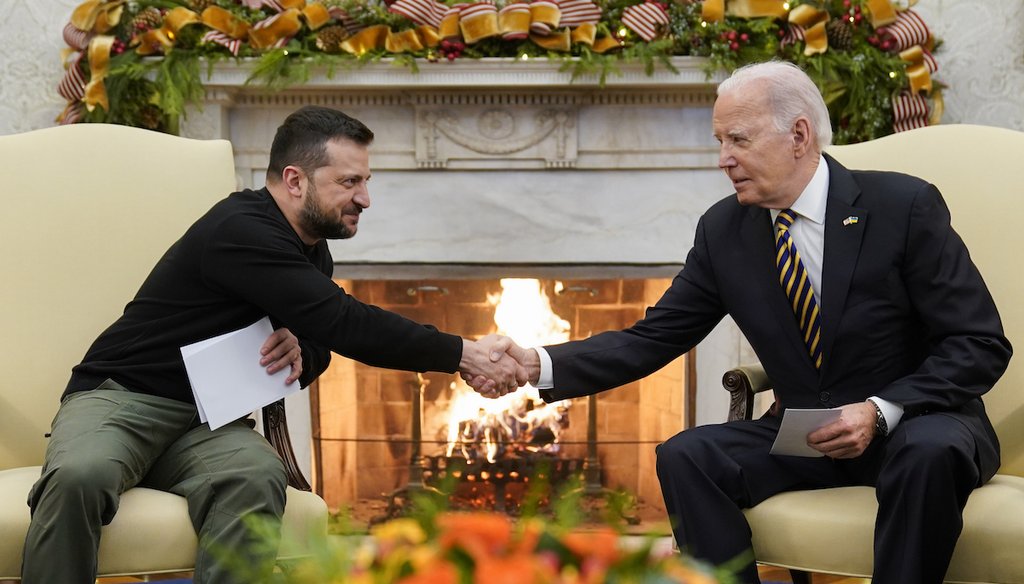Stand up for the facts!
Our only agenda is to publish the truth so you can be an informed participant in democracy.
We need your help.
I would like to contribute

President Joe Biden shakes hands with Ukrainian President Volodymyr Zelenskyy as they meet in the Oval Office on Dec. 12, 2023. (AP)
With Congress divided over allocating more funding to Ukraine for its fight against Russia, President Joe Biden’s critics recently said the administration is using the threat of sending American troops to fight Russia as a bargaining chip.
Accusations that the White House is leveraging American service members’ lives to fund the Ukraine war have garnered millions of views online, so we decided to take a closer look.
On Dec. 6, Tucker Carlson — the ousted Fox News host who said he will start his own network — posted on X, formerly Twitter:
"The Biden administration is openly threatening Americans over Ukraine. In a classified briefing in the House yesterday, defense secretary Lloyd Austin informed members that if they don’t appropriate more money for Zelensky, ‘we’ll send your uncles, cousins and sons to fight Russia.’ Pay the oligarchs or we’ll kill your kids."
Elon Musk, X’s billionaire owner, asked Carlson in a reply, "He really said this?" To which Carlson responded, "He really did. Confirmed." Despite Carlson’s assurances, we have found no news stories with named sources confirming those remarks from Austin.
Other conservative social media accounts amplified Carlson’s comments. Colin Rugg, co-owner of conservative news site TrendingPolitics, posted Dec. 7 on X that Carlson’s "revelation comes just days after White House official John Kirby said that ‘American blood’ will be the ‘cost’ of supporting Ukraine if we stop sending them money. Your government has an addiction. That addiction is war."
Donald Trump Jr., whose father is the front-runner for the 2024 Republican presidential nomination, shared Rigg’s post later that day.
Trump Jr. wrote, "America doesn't need to keep funding an endless war with no path to victory. … No more big wars no more funding the military industrial complex! For those of you who are idiots Ukraine lost this war quite some time ago we're just keeping them on life-support with never ending money!"
The narrative from Carlson, Rigg and Trump Jr. quickly drew its own criticism.
A "community note" — a crowdsourced feature that lets X users append posts with additional context — was tacked to Carlson’s post, citing Dec. 5 coverage by the Messenger, an online news outlet. The Messenger had reported that Austin was referring to the possibility of U.S. troops being sent to defend NATO allies that "Russia may target next" if Ukraine is overrun.
Fox News Pentagon correspondent Jennifer Griffin on Dec. 7 posted on X a similar note of caution about interpreting Austin’s remarks.
"This characterization of Austin’s remarks is 100 percent not true, acc(ording) to two sources who were in the briefings," Griffin wrote, without naming the sources. "Austin warned that it is not hyperbole to say Putin won’t stop at Ukraine. If he enters NATO territory US troops could be called to fight; cheaper to fund Ukraine now."
What Austin said to lawmakers privately remains undocumented, but Griffin’s description of his remarks tracks with the public messages that Biden and Kirby, the strategic communications coordinator for the White House’s National Security Council, have offered.
Biden and Kirby have argued that if Ukraine falls, Russia likely would attack nations such as Estonia, Latvia and Lithuania, each a member of NATO, the North Atlantic Treaty Organization. If Russia attacks a NATO member nation, it could prompt NATO to invoke Article 5, its collective defense mechanism, opening the door to direct U.S. military assistance in the ally’s (or allies’) defense.
On Dec. 6, Biden made this point in public remarks that urged Congress to approve more money for Ukraine:
"If Putin takes Ukraine, he won’t stop there. It’s important to see the long run here. He’s going to keep going. He’s made that pretty clear. If Putin attacks a NATO ally — if he keeps going and then he attacks a NATO ally — well, we’ve committed as a NATO member that we’d defend every inch of NATO territory. Then we’ll have something that we don’t seek and that we don’t have today: American troops fighting Russian troops … if he moves into other parts of NATO."
Kirby’s comments the same day at a White House press briefing made an identical point.
"If Putin gets all of Ukraine, then what? Then where does he go? Because right then, he’s up against the eastern flank of NATO," Kirby said. "And if you think the cost of supporting Ukraine is high now, just imagine how much higher it’s going to be — not just in national treasure, but in American blood — if he starts going after one of our NATO Allies."
White House allies in Congress sounded a similar refrain.
If Russian President Vladimir Putin "moves on a NATO country — and I don’t think it’s outside the realm of possibility — there is a fight involving U.S. troops if we don’t support Ukraine’s fight right now," said Sen. Chris Murphy, D-Conn., in an interview after the closed-door hearing, the Messenger reported.
The Biden administration is, as critics contend, leveraging concerns about a future boots-on-the ground presence in an effort to persuade lawmakers to approve more funding for Ukraine.
However, the framing of the critiques obscure, and sometimes twist, the administration’s logic.
Rather than reflecting an "addiction" to war, as Rugg put it, or endless funding for "the military industrial complex," as Trump Jr. put it, the White House argument is that money and arms for Ukraine today could slow the Russian offensive in Ukraine. This, in turn, could prevent Russia from invading allies whose NATO membership entitles them to direct U.S. military assistance.
The White House’s strategy of funding Ukrainian resistance, its argument goes, is designed to reduce the likelihood of U.S. forces fighting Russia, not increase it.
Our Sources
Tucker Carlson, post on X, Dec. 6, 2023
Elon Musk, post on X, Dec. 7, 2023
Tucker Carlson, post on X, Dec. 7, 2023
Colin Rugg, post on X, Dec. 7, 2023
Donald Trump Jr., post on X, Dec. 7, 2023
Jennifer Griffin, post on X, Dec. 7, 2023
White House, "Remarks by President Biden Urging Congress to Pass His National Security Supplemental Request, Including Funding to Support Ukraine," Dec. 6, 2023
White House, "Press Briefing by Press Secretary Karine Jean-Pierre and NSC Coordinator for Strategic Communications John Kirby," Dec. 6, 2023
The Messenger, "Austin Warns Congress Failing to Pass Ukraine Aid ‘Very Likely’ Leads to US Troops on the Ground In Europe," Dec. 5, 2023
Mediaite, "Fox News Correspondent Jennifer Griffin Fact-Checks Tucker Carlson’s Wild Claim About Biden Administration: ‘100% Not True,’" Dec. 7, 2023
PolitiFact, "Could a strike by Russia on Poland trigger Article 5 and bring NATO into war?" March 14, 2022












































